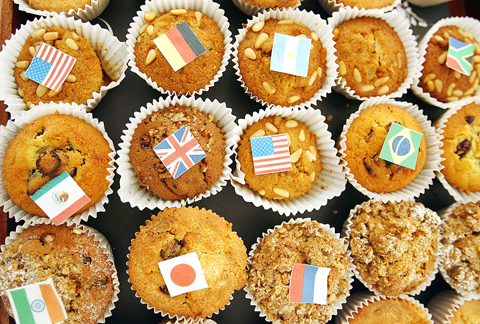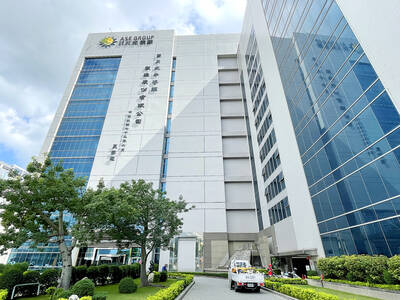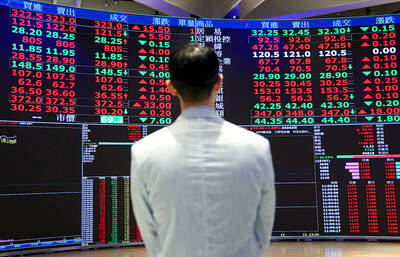Finance officials from countries that comprise more than 80 percent of the world economy headed into round-table talks yesterday aimed at finding common ground amid deep divisions on how to tackle the global downturn.
Finance ministers and central bankers from the G20 countries were divided over whether to use fiscal stimulus — big spending packages and tax cuts — or better regulation to drag the world economy out of its slump.
The US wants countries to make a coordinated commitment to increase spending as a vital part of any rescue effort, but many European countries are balking at loading up on debt, preferring to focus on reform of the international financial architecture.

PHOTO: BLOOMBERG
The IMF estimates that only Saudi Arabia, Australia, China, Spain and the US will introduce budget boosts of 2 percent of GDP this year, the level that US Treasury Secretary Timothy Geithner considers “reasonable.”
Complicating matters, China has raised warnings about what Washington’s drive to spend its way out of recession might do to US government debt, which Beijing holds in large quantities.
Chinese Premier Wen Jiabao (溫家寶) has sent a clear warning: Don’t devalue the dollar — and China’s estimated US$1 trillion in dollar-denominated US government debt — through reckless spending.
US Treasury spokeswoman Heather Wong countered that concern, saying that the US Treasury market “remains the deepest and most liquid market in the world” and that US President Barack Obama was committed to restoring growth and fiscal sustainability.
Officials held one-to-one talks on Friday before yesterday’s full round-table meeting. Geithner met with Japanese Finance Minister Kaoru Yosano, whose government backs the US call for more spending, as well as with Mexican Treasury Secretary Agustin Carstens and European Central Bank Chief Jean-Claude Trichet on Friday. But he had no announced plans for talks with the Chinese delegation.
The debate on spending or regulation amid the wider G20 — which includes emerging powerhouses such as China, India and Brazil along with the world’s wealthiest countries — is threatening to derail progress.
The meeting at a country lodge in Horsham, 50km south of London, is to lay the groundwork for a full summit of G20 heads of state and government on April 2 and there are fears that it will do too little to set a common agenda for that gathering.
“The danger now is doing nothing too little, too late,” World Bank President Robert Zoellick warned after arriving in Britain for the meeting. “Incremental changes will prolong and increase risks.”
Meanwhile, French Finance Minister Christine Lagarde told reporters she was optimistic that the meeting could get results by discussing economic stimulus plans, global financial regulation and rescuing troubled banks.
Zoellick, a former top US State Department official who has forecast the world economy will shrink by 1 percent to 2 percent this year, said that this year “is shaping up to be a very dangerous year” and added that difficulties could extend “well into 2010.”
Zoellick said that he was afraid that fiscal stimulus without reform to clean up the troubled assets weighing down banks balance sheets and recapitalize the banks would lead to a delayed headache after the immediate crisis.
“Turnaround can’t happen unless you clean up the bad assets and recapitalize the banks,” he said. “If you don’t take on the banking issue, the stimulus is just like a sugar high. It pushes some energy through the system, but then you get the let down unless you reopen the credit markets.”
While the UK has begun a program to insure so-called toxic assets from banks, the US has yet to implement a similar plan.
One thing both the US and European officials do agree on is the need to increase funding to the IMF so it can help countries in trouble.
The 16 nations that use the euro agreed this week to urge governments to double the IMF’s resources to US$500 billion and give it a key role overseeing risks to the global economy.

EXPANSION: The investment came as ASE in July told investors it would accelerate capacity growth to mitigate supply issues, and would boost spending by 16 percent ASE Technology Holding Co (ASE, 日月光投控), the world’s biggest chip assembly and testing service provider, yesterday said it is investing NT$17.6 billion (US$578.6 million) to build a new advanced chip packaging facility in Kaohsiung to cope with fast-growing demand from artificial intelligence (AI), high-performance-computing (HPC) and automotive applications. The new fab, called K18B, is to commence operation in the first quarter of 2028, offering chip-on-wafer-on-substrate (CoWoS) chip packaging and final testing services, ASE said in a statement. The fab is to create 2,000 new jobs upon its completion, ASE said. A wide spectrum of system-level chip packaging technologies would be available at

Taiwan’s foreign exchange reserves hit a record high at the end of last month, surpassing the US$600 billion mark for the first time, the central bank said yesterday. Last month, the country’s foreign exchange reserves rose US$5.51 billion from a month earlier to reach US$602.94 billion due to an increase in returns from the central bank’s portfolio management, the movement of other foreign currencies in the portfolio against the US dollar and the bank’s efforts to smooth the volatility of the New Taiwan dollar. Department of Foreign Exchange Director-General Eugene Tsai (蔡炯民)said a rate cut cycle launched by the US Federal Reserve

HEAVYWEIGHT: The TAIEX ended up 382.67 points, with about 280 of those points contributed by TSMC shares alone, which rose 2.56 percent to close at NT$1,400 Shares in Taiwan broke records at the end of yesterday’s session after contract chipmaker Taiwan Semiconductor Manufacturing Co (TSMC, 台積電) hit a fresh closing-high amid enthusiasm toward artificial intelligence (AI) development, dealers said. The TAIEX ended up 382.67 points, or 1.45 percent, at the day’s high of 26,761.06. Turnover totaled NT$463.09 billion (US$15.22 billion). “The local main board has repeatedly hit new closing highs in the past few sessions as investors continued to embrace high hopes about AI applications, taking cues from a strong showing in shares of US-based AI chip designer Nvidia Corp,” Hua Nan Securities Co (華南永昌證券) analyst Kevin Su

Nvidia Corp’s major server production partner Hon Hai Precision Industry Co (鴻海精密) reported 10.99 percent year-on-year growth in quarterly sales, signaling healthy demand for artificial intelligence (AI) infrastructure. Revenue totaled NT$2.06 trillion (US$67.72 billion) in the last quarter, in line with analysts’ projections, a company statement said. On a quarterly basis, revenue was up 14.47 percent. Hon Hai’s businesses cover four primary product segments: cloud and networking, smart consumer electronics, computing, and components and other products. Last quarter, “cloud and networking products delivered strong growth, components and other products demonstrated significant growth, while smart consumer electronics and computing products slightly declined,” compared with the